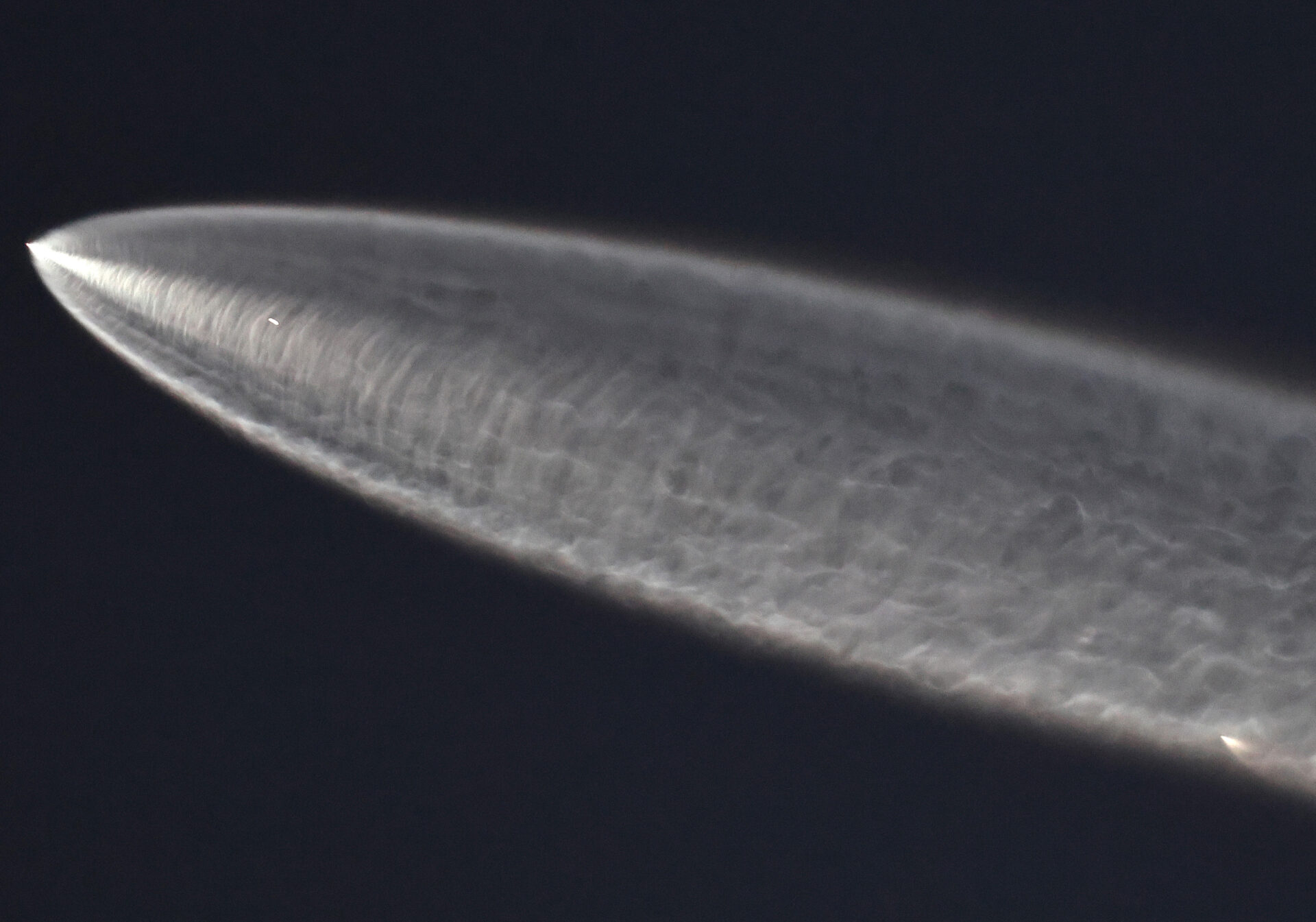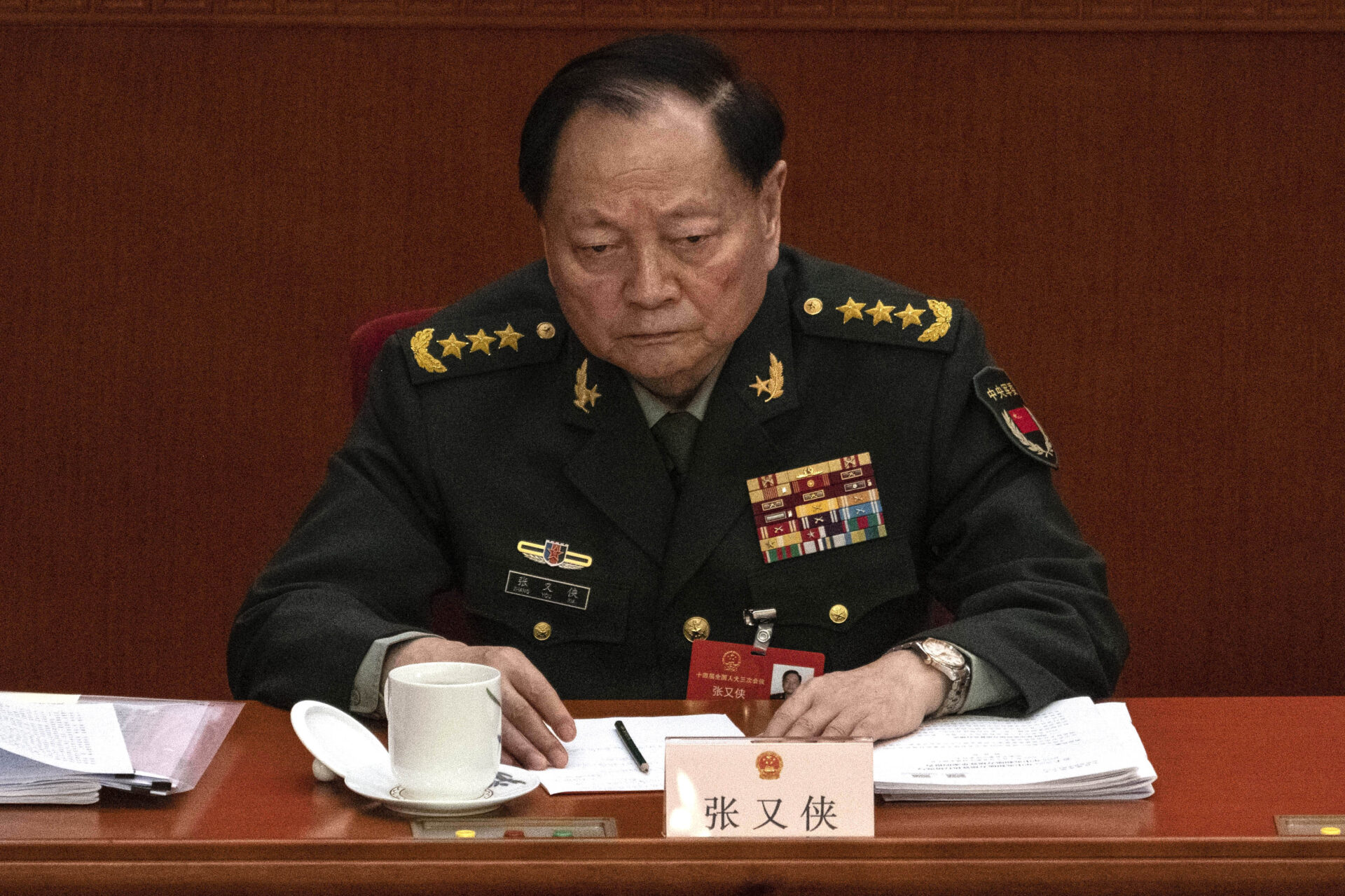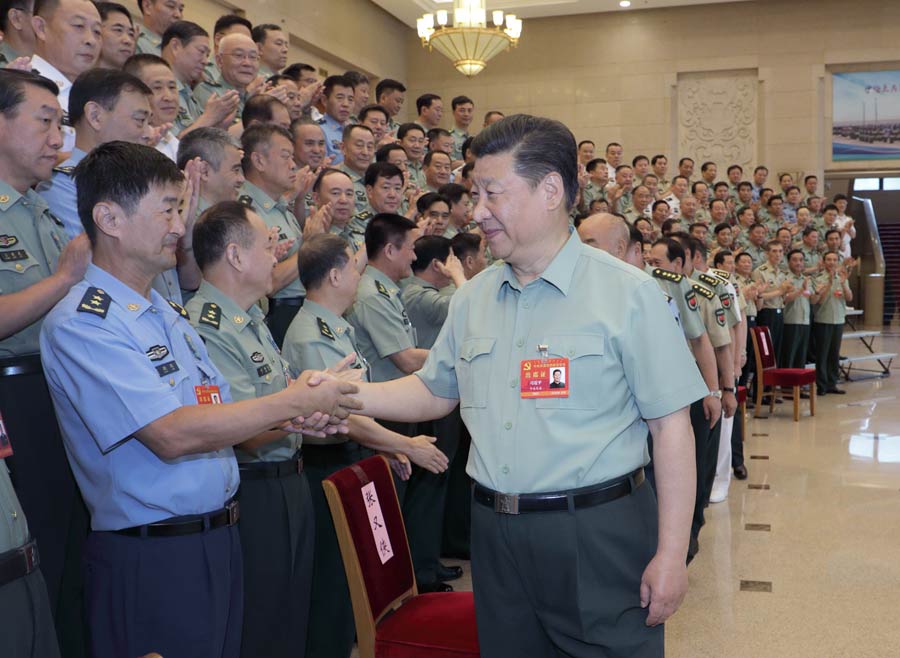
Who Will Hold “The Barrel of a Gun” in Xi’s Third Term?: Recent PLA Promotions and the Outlook for the Next Central Military Commission
Who Will Hold “The Barrel of a Gun” in Xi’s Third Term?: Recent PLA Promotions and the Outlook for the Next Central Military Commission
Introduction
On January 21, General Secretary and Central Military Commission (CMC) chairman Xi Jinping promoted seven senior People’s Liberation Army (PLA) military and armed police officers to the rank of general: Political Commissar (PC) of Northern Theater Command Liu Qingsong, Commander of Central Theater Command (TC) Wu Ya’nan, PC of Central TC Xu Deqing, PC of Army Qin Shutong, PC of Navy Yuan Huazhi, Commander of Rocket Force Li Yuchao and PC of the People’s Armed Police (PAP) Zhang Hongbing (Xinhua, January 21). The personnel changes were the latest in a spree of promotions by Xi, who has elevated a record 38 officers to the full general rank since 2019. Xi’s rapid promotion of so many generals is extraordinary as it breaches long-standing military convention. In the past, the CMC chairman has normally presided over only one round of promotion of full generals per year, usually around Army Day on August 1 (八一, bayi) (China Brief, January 25).
Uncertainty surrounding the promotion process for PLA generals has increased since Chinese military reforms kicked off in 2016. Such developments triggered a discussion of whether objective qualifications have been replaced with Xi’s subjective preferences. Since judging the candidates’ relations with Xi and the level of subjective preference is difficult, this article argues that basic qualifications – age, seniority and experience, and other indicators for advancements such as key positions, leader’s preference and party involvement – remain key considerations for promotion. Nevertheless, as some observers have suggested, changing patterns of generals’ promotion may also reflect Xi’s efforts to ensure he retains his core leader status at the 20th Party Congress in late 2022.
Basic Qualification – Age, Seniority, Experience
Since the People’s Republic of China (PRC) launched sweeping military reforms in November 2015, the organizational structure of the CMC has not only been reshaped and the hardware of the PLA upgraded, but the military officer grade and rank system has also been restructured to strengthen joint operation capabilities. The reorganization has altered promotion patterns in the military ranks, and the qualifications of some generals promoted by Xi have broken with past convention. The intersection of lengthy reform processes and potential underlying political motives increase the difficulty and uncertainty of assessing the significance of the promotion of PLA generals. Many are of the opinion that as Xi has consolidated control of the military that previous objective qualifications for promotion have been superseded by Xi’s subjective preference for personal loyalty. For example, generals that Xi knew when he worked in Fujian and Zhejiang provinces from 1985 to 2007 have received more promotion opportunities. [1]
However, building a modern military still requires regulation and standardization of education, training, assessment and promotion processes to manage and cultivate talent in key leadership positions. It is also difficult to judge the candidates’ relations with Xi and the level of subjective preference. Therefore, this article argues that age, seniority, and experience are still important qualifications for generals in the promotion process. We have assigned the following scoring system for these three qualifications in the promotion process (See Table 1):
- Age: The most basic public personnel information, more consistent with the Chinese Communist Party (CCP) personnel operation “age line.” In the crucial year of 2022 for the CCP’s “20th National Congress” and the year 2027 for “21st National Congress”, age is a key criterion for promotion.
- Seniority: Candidates who have served in the sub-theater position for 2-4 years have more opportunities for promotion. Candidates who served for more than 4 years are secondary, but are more likely to be promoted than candidates who have served less than 2 years, since it is not appropriate to reassign them in such a short time.
- Experience: The position of the theater deputy leader shows the diversity of the experiences of the CCP generals and brigades, and those with diverse experiences are likely to have an advantage in being considered for promotion.
Table 1: Scoring Formula
| Age | 63 years-old in 2022 | Under 63 in 2022 | Under 63 in 2027 |
| 0 | +1 | +2 | |
| Seniority | Served as deputy theater or above for less than 2 years | Served as deputy theater or above for more than 2 years to less than 4 years | Served as deputy theater or above for more than 4 years |
| +0 | +2 | +1 | |
| Experience | Served as only 1 position in the deputy theater or above | Served as more than 1 position in the deputy theater or above | |
| +0 | +1 |
The PLA promotion cycle has been irregular since the Chinese military reforms got underway in 2016 (China Daily, January 1, 2016). No promotions were held in 2018, so the timeframe starts from 2019 until January 2022. After observing the promotions after 2019 (See Appendix), it is apparent that basic qualifications still matter. While seniority is the most important qualification, there appears to be an increasing emphasis on age whilst ignoring experience at the same time. For example, among ten promoted generals in July 2019, no one qualified in age and only four generals (40%) qualified in terms of experience. However, among the seven promoted generals in January 2022, all of them are qualified in age (100%) but less than 20% (only one general) are qualified with regard to experience. (See Figure 1, (See Appendix one for statistics). The average age of promoted generals dropped significantly from almost 62 years old in July 2019 to nearly 58 years old in January 2022. (See Figure 2). [2] Since the timeframe in this article is short (2019-2022), and many officers were rapidly promoted to general during this period, there are many variables that affect the metric of experience. As experience likely remains an indispensable and important criterion in the long-term observation of the promotion of CCP generals, it is still considered a basic qualification.
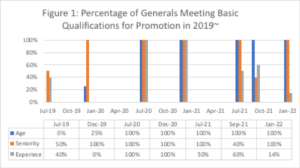
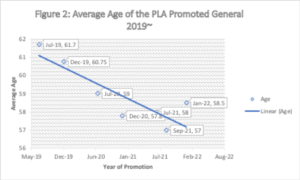
Advanced Indicators
On the grounds of basic qualifications, three factors – key position, leader preference and party involvement –are used as advanced indicators to assess the possibility of candidates’ promotion.
- Officers in key positions, which refers to the typical branch of service or force, traditionally crucial positions and new positions after military reform. Lieutenant Generals who are from the Ground Force have been more likely to be promoted. Since Xi launched military reforms in late 2015, he has promoted 52 senior officers to full-general rank: 24 (52.17%) from the Ground Force, Six (13.04%) from the navy and 10 (21.74%) from the air force. There may be more vacancies in the army and air force because they assist other services such as the People’s Armed Police (PAP) and the Strategic Support Force (SSF). Most PAP generals come from the army, and SSF generals tend to have air force backgrounds (See Appendix 2)
LGs who occupied traditional key positions have been more likely to be promoted. For example, the Deputy Chief of Joint Staff (DCJS) of the CMC was the Deputy Chief of Staff (DCS) in the General Staff Department and served by the rank of General before military reform. LG Yi Xiaoguang, who became DCS in November 2015, was not only promoted in July 2016 to be youngest General in any full service, but was also appointed Central TC commander and is the first PLA Air Force senior officer to head a TC (Global Times, October 1, 2019) Since military reforms got underway in 2016, DCJS started to be staffed mainly by officers holding LG rank (CRNTT, January 18, 2017). Before military reforms, this role was only filled by full Generals. Therefore, the LG who occupied the position of DCJS could be a viable candidate for becoming a PLA General (See Table 2). [3] One reason that this position has been opened up to lower-ranked generals is that in 2019 it was downgraded from TC leader to TC deputy leader grade.
Table 2: Deputy Chief of Joint Staff Appointed after 2016
| Name | Rank | Birth | Dates of Service | Follow-up |
| Ma Yiming | LG | 1957.08 | 2017.01—2020.12 | Retired (Dec. 2020) |
| Shao Yuanming | MG | 1956.12 | 2017.01~ | Promoted to LG (Jul. 2018) |
| Chang Dingqiu | MG | 1967.01 | 2017.12—2021.08 | Promoted to LG (Jul. 2018)
Promoted to Gen. (Sep. 2021) |
| Li Jun | LG | 1963.09 | 2020.12~ | |
| Wu Yanan | LG | 1962.08 | 2020.12—2022.01 | Promoted to Gen. (Jan. 2022) |
| Jing Jianfeng | LG | 1966 | 2021.12— |
Following the initiation of military reforms, Major Generals (MG) or LGs in new positions have also received more opportunities for promotion. For example, among the commander and PC of the 13 group armies which were formed in 2017, 53.8 percent (14/26) were promoted to LG. Among the promoted LG from 13 group armies, 50 percent (7/14) were promoted to General. (See Table 3) [4]
Table 3: Leadership of New Group Armies in 2017
| Group Army | Position & Name | Birth/ Age | Rank | ||||
| Maj. Gen | Lt. Gen | Gen. | |||||
| 71st | C | Wang Yinfang | Sep. 1962/ 59yr | ◎ | |||
| PC | Xu Deqing | Jul. 1963/58yr | ◎ | ◎(2019.06) | ◎(2022.01) | ||
| 72nd | C | Zhe Xiaohui | N/A | ◎ | |||
| PC | Wang Wemquan | Dec. 1962/59yr | ◎ | ◎(2020.06) | |||
| 73rd | C | Hu Zhongqiang | Jan.1967/55yr | ◎ | ◎ | ||
| PC | Yang Cheng | Dec. 1964/57yr | ◎ | ◎(2020.07) | |||
| 74th | C | Xu Xianghua | May. 1965/57yr | ◎ | |||
| PC | Liu Hongjun | N/A | ◎ | ||||
| 75th | C | Gong Maodong | N/A | ◎ | |||
| PC | Qin Shutong | Nov. 1963/58yr | ◎ | ◎(2019.06) | ◎(2022.01) | ||
| 76th | C | Fan Chengcai | Jan.1964/58yr | ◎ | ◎(2019.06) | ||
| PC | Zhang Hongbing | Jan. 1966/56yr | ◎ | ◎(2019.12) | ◎(2022.01) | ||
| 77th | C | Lin Huomao | Nov. 1963/58 | ◎ | |||
| PC | Li Zehua | N/A | ◎ | ||||
| 78th | C | Wu Yanan | Aug. 1962/59yr | ◎ | ◎(2020.04) | ◎(2022.01) | |
| PC | Guo Xiaodong | Nov. 1960/61yr | ◎ | ||||
| 79th | C | Xu Qiling | Jul. 1962/ 59yr | ◎ | ◎(2019.12) | ◎(2021.07) | |
| PC | Yu Yonghong | May. 1963/59yr | ◎ | ◎(2019.12) | |||
| 80th | C | Wang Xiubin | Mar. 1964/58yr | ◎ | ◎(2019.12) | ◎(2021.07) | |
| PC | Zhu Yuwu | Mar. 1962/60yr | ◎ | ||||
| 81st | C | Huang Ming | Apr. 1963/59yr | ◎ | ◎(2019.12) | ||
| PC | Fang Yongxiang | Aug. 1966/55yr | ◎ | ◎(2022.01) | |||
| 82nd | C | Ling Xiangyang | Oct. 1964/ 57yr | ◎ | ◎(2020.04) | ◎(2021.08) | |
| PC | Zhang Mengbin | 1962/60 | ◎ | ||||
| 83rd | C | Xie Zenggang | N/A | ◎ | |||
| PC | Lu Shaoping | Oct. 1961/60yr | ◎ | ||||
Following the initiation of military reforms, Major Generals (MG) or LGs in new positions have also received more opportunities for promotion. For example, among the commander and PC of the 13 group armies which were formed in 2017, 53.8 percent (14/26) were promoted to LG. Among the promoted LG from 13 group armies, 50 percent (7/14) were promoted to General. (See Table 3)
- CMC Chairman’s Preferences: Chairman Xi’s preferred candidates can be broken down in to two kinds: 1) those officers he knew when he worked in Fujian and Zhejiang provinces, and 2) those officers who have occupied crucial positions focused on stabilizing restive regions. Army PC Qin Shutong can be classified as the first type of candidate typically preferred by Xi as he served as a regiment PC in the Nanjing Military Region in 2003, when Xi also worked in Zhejiang Province (China Military, July 7, 2003). Candidates who have experience in the Western TC – the unstable region that includes Xinjiang and Tibet – may have greater opportunities to strengthen their capabilities and demonstrate loyalty, which could result in opportunities for promotion. (China Military Watch, October 1, 2021). For example, Central TC PC Xu Deqing served as PC of the 47th Group Army, which was part of the former Western TC Lanzhou Military Region during 2015-2017 (ifeng, September 27, 2015). The PC of the Rocket Force Xu Zhongbo was the first PC of the Western TC Ground Force in 2016 (epaper, February 2, 2016). Xu Deqing took over this position in 2018 (Sina. June 10, 2016).
- Involvement in Party Leadership: Party involvement has always been one of the most important indicators of promotion. According to the political practices of the PLA, the two CMC vice-chairmen are members of the Political Bureau (Politburo) of the Central Committee of the CCP. [5] “Theater command-level” officers, commanders, and PCs are all members of the CPC Central Committee.
However, CCP promotion– especially promotion to the Central Committee and higher –is subject to the election of the National Congress of the Chinese Communist Party (NCCCP) i.e. the Party Congress, which is held every five years. However, appointments of alternate members are made during plenary meetings of the Central Committee. In the past two years, the generals and officers who have been promoted to the “Theater-Command-level” are also expected to be promoted to members of the CCP Central Committee at the “20th National Congress” in Autumn 2022.
Figure 3 shows promoted generals’ party involvement from 2019 to 2022. Most of the promoted generals before 2021 have been members of the Central Committee Member (CCM), or at least alternate members of the Central Committee (ACCM). However, since 2021, for the upcoming CCP’s “20th National Congress”, many generals who have been promoted had not yet served even in alternate positions of the CCM due to the rapidity of the promotion process.
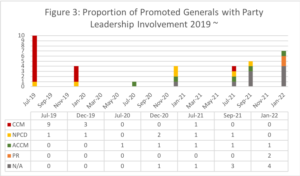
Implications
After examining the dynamics of PLA general officer promotion patterns through surveying basic qualification and advanced indicators, three implications appear as follows:
- Institution First: So far, Xi’s personnel transfers to senior generals ahead of the 20th Party Congress still prioritize the PLA’s organizational needs. Since basic qualifications – age, seniority and experience – still matter in the promotion of Generals, this not only reflects that institutionalization still exists but also implies that, while focusing on choosing the candidates by his subjective preference, excessive politicization is also one of Xi’s major issues impeding PLA reform.
- Connections and Position Second: Although they still need to meet the basic qualifications, candidates who have occupied crucial positions or who have worked with Xi possess advantages when it comes to promotion, as they have accumulated credibility with the CMC chairman and have proven their loyalty to him.
- Xi’s Timetable: The decreasing average age of promoted generals, especially those who do not have a party leadership position, implies Xi’s eagerness to firmly grasp military power in order to successfully navigate the 20th Party Congress and continue his tenure as the top leader. It is also in line with the traditional thinking of the CCP that “political power grows out of the barrel of a gun.” Hence, an obvious “metabolism” among the top generals exists in the CCP. These new generals will be promoted to high-level party positions by Xi Jinping at the 20th Party Congress of the CCP, and become the main leaders of the army during his third term.
Conclusion
Ahead of China’s 20th Party Congress, there are two key developments to watch with regard to the next round of promotion of generals and determining the composition of the next CMC.
According to CCP conventions on retirement age, the two CMC vice-chairmen, Xu Qiliang and Zhang Youxia, and two CMC members, Wei Fenghe and Li Zuocheng, are all due to retire at the 20th Party Congress. As a result, CMC members Miao Hua and Zhang Shengmin will be the only two members of the CMC of the CCP who are expected to be re-elected to the Military Commission after the 20th National Congress, which means they have a higher chance of taking over as the CMC vice chairman. The vacancies in the CMC will go to generals who are under age 65, currently serving, or have just stepped down from “Theater-Command-level” positions. However, it is still possible that Xi makes unexpected and untraditional military personnel arrangements during the 20th Party Congress. First, while Miao Hua and Zhang Shengmin are most likely to take over as CMC vice chairmen due to their age and qualifications, not only is their expertise overlapping, but they also lack the experience in command and general staff. Miao came up in the navy and served in the political system of the Communist Army for a long time, and Zhang is from the Disciplinary inspection system services. This will be an unprecedented situation for the CCP and the PLA. In the past, there was at least one of the CMC vice chairman who was either a founding father of the country, outstanding in technological development such as strategic weaponry, or had the background of operational command or candidate of CCP leader. However, both Miao and Zhang do not meet these qualifications. Secondly, several generals who have close ties with Xi have been rapidly promoted in recent years. For example, after serving as the commander of the Central TC for less than half a year, Lin Xiangyang was transferred to the Eastern TC in January 2022. It is worth watching whether he will be promoted directly to the CMC during the 20th Party Congress to “escort” Xi’s third term. In addition, Xu Deqing, PC of the Central TC, Qin Shutong, PC of the Army, Zhang Hongbing, PC of the PAP, Wu Yanan, commander of the Central TC, and Wang Xiubin, commander of the Southern TC, were all born after 1962 and were all promoted from lieutenant general to general in about 3 years. Moreover, they were recently transferred to the Commanders or PC of the theater-level. They are also candidates for becoming new members of the CMC.
Table 4: Promotion of Political Commissars 2016~
| Theater Command (TC) Political Commissar | |
| Eastern TC | He Ping (2019.12) |
| Southern TC | Wang Jianwu (2019.12) |
| Western TC | Zhu Fuxi (2016.07), We Shezhou (2019.07), Li Fengbiao(?) |
| Northern TC | Fan Xiaojun (2019.07), Liu Qingsong (2022.01) |
| Central TC | Zhu Shengling (2019.07), Xu Deqing (2022.01.21) |
| Service Political Commissar | |
| PLA Army | Liu Lei (2017.07), Qin Shutong (2022.01) |
| PLAN | Qin Shengxiang (2019.07), Yuan Huazhi (2022.01) |
| PLAAF | Yu Zhongfu (2017.07.28), Guo Puxiao (2022.01) |
| Rocket Force | Wang Jiasheng (2017.07), Xu Zhongbo (2020.07) |
| SSF | Li Wei (2020.12) |
| PAP | An Zhaoqing (2019.07), Zhang Hongbing (2022.01) |
In regards to the next General promotion, should it be held in the summer as has occurred in the previous three years, it will be the last chance for Xi to elevate trusted personnel in the brass before the 20th Party Congress. In such a situation, it is reasonable that Xi would prefer younger candidates born after 1962, who could serve until 2027. The current Deputy Commander of the PAP Hu Zhongqiang, the Army Commander of the Central TC Fan Chengcai, the Army Chief of Staff Huang Ming, the PC of the Xinjiang Military Region Yang Cheng, and the deputy PC of the Southern TC Fang Yongxiang, have been promoted to LG have the relevant qualifications, and would be expected to be promoted to general in the future. The PC of the 79th group army Yu Yonghong was recently promoted to LG and was also born after 1962. As all the PC positions in Theater level have been filled (See Table 4), it is difficult for PLA officials to spare a vacancy for Yu. While current discussion among China military watchers concerns the PLA’s capabilities and the potential conflict in Taiwan Strait, it is important to realize that the most pressing issue for CMC chairman Xi is to ensure his leadership for his third term in 2022 and possibly even a fourth term in 2027 (China Brief, May 27). On the other hand, the dynamics of top PLA personnel promotion provide insights into CCP leaders’ priorities for military affairs. The possibility of putting the Taiwan issue into priority cannot be ignored once the PLA general promotion has been settled and institutionalized
Eli Y. Huang is a Ph.D. Student at Graduate Institute of East Asian Studies, National Cheng-Chih University. She is the special assistant of Dr. Chong-Pin Lin, former defense minister of Taiwan and associate fellow of Taiwan Industry Economy Association.
Reginald Y. Lin is an associate fellow from Foundation of Asia-Pacific Peace Studies (FAPS) in Taiwan, who focuses on CCP personnel promotion.
The authors would like to thank Chong-Pin Lin, Arthur Ding, and Joseph Y. Lin for their helpful comments on an earlier draft of this article.
Editor’s Note: This piece was edited slightly on June 28, 2022.
Notes
[1] Shen Mingshi, “Observation on the recent transfer of PLA generals and personnel arrangements” (近期解放軍將領調動及人事安排觀察), Monthly Brief of ROC Mainland Affairs Council, 2018.09, https://ws.mac.gov.tw/Download.ashx?u=LzAwMS9VcGxvYWQvMjk1L2NrZmlsZS82MWExNjczYi1lM2MzLTQ2MzItYTBjYy1lYmRjOTgxODZiYjUucGRm&n=MjAxODA5MDUucGRm
[2] Statistics on officers’ qualifications are drawn from the following state media outlets: 81.cn, China Military, Xinhua, Guancha)
[3] Ibid
[4] Ibid
[5] See Reginald Lin, Eli Yin-shan Huang, “China Military Watch”, The Strategist, October 1, 2021. https://www.aspistrategist.org.au/china-military-watch-11/
Appendix 1: List of PLA General Promotions since 2019
| Name | Position | A | S | E | Total | ||
| 2019 | |||||||
| Jul. 31st | Li Shangfu | CMC Equipment Development Department Director | 0 | 2 | 1 | 3 | CCM |
| Yuan Yubai | Southern TC Commander | 0 | 1 | 0 | 1 | CCM | |
| Wu Shezhou | Western TC PC | 0 | 2 | 1 | 3 | CCM | |
| Fan Xiaojun | Northern TC PC | 0 | 1 | 0 | 1 | CCM | |
| Zhu Shengling | Central TC PC | 0 | 1 | 1 | 2 | CCM | |
| Shen Jinlong | Navy Commander | 0 | 2 | 0 | 2 | CCM | |
| Qin Shengxiang | Navy PC | 0 | 1 | 0 | 1 | CCM | |
| Ding Laihang | PLAAF Commander | 0 | 1 | 0 | 1 | CCM | |
| Zheng he | President of NDU | 0 | 2 | 1 | 3 | CCM | |
| An Zhaoqing | PAP PC | 0 | 2 | 0 | 2 | NPCD | |
| Dec. 12th | He Weidong | Eastern TC Commander | 0 | 2 | 0 | 2 | NPCD |
| He Ping | Eastern TC PC | 0 | 2 | 0 | 2 | CCM | |
| Wang Jianwe | Southern TC PC | 0 | 2 | 0 | 2 | CCM | |
| Li Qiaoming | Northern TC Commander | 1 | 2 | 0 | 3 | CCM | |
| 2020 | |||||||
| Jul. 29th | Xu Zhongbo | Rocket Force PC | 1 | 2 | 1 | 4 | ACCM |
| Dec. 18th | Guo Puxiao | CMC Logistic Support Department PC | 2 | 2 | 1 | 5 | NPCD |
| Zhang Xudong | Western TC Commander | 1 | 2 | 1 | 4 | N/A | |
| Li Wei | Strategic Support Force (SSF) PC | 1 | 2 | 1 | 4 | NPCD | |
| Wang Chunning | PAP Commander | 1 | 2 | 1 | 4 | ACCM | |
| 2021 | |||||||
| Jul. 5th | Wang Xiubin | Southern TC Commander | 2 | 1 | 0 | 3 | ACCM |
| Xu Qiling | Western TC Commander | 1 | 1 | 1 | 3 | NPCD | |
| Liu Zhenli | Army Commander | 2 | 2 | 1 | 5 | CCM | |
| Ju Qiansheng | SSF Commander | 1 | 1 | N/A | 2 | N/A | |
| Sep. 6th | Wang Haijiang | Western TC Commander | 1 | 0 | 1 | 2 | NPCD |
| Lin Xiangyang | Central TC Commander | 2 | 0 | 0 | 2 | N/A | |
| Dong Jun | Navy Commander | N/A | 0 | 1 | 1 | N/A | |
| Chang Dingqiu | PLAAF Commander | 2 | 1 | 1 | 4 | ACCM | |
| Xu Xueqiang | NDU President | 1 | 1 | 0 | 2 | N/A | |
| 2022 | |||||||
| Jan. 22nd | Wu Ya’nan | Central TC Commander | 1 | 2 | 1 | 4 | PR |
| Li Yuchao | Rocket Force Commander | 1 | 2 | 0 | 3 | ACCM | |
| Liu Qingsong | Northern TC PC | 1 | 2 | 0 | 3 | N/A | |
| Xu Deqing | Central TC PC | 1 | 1 | 0 | 2 | PR | |
| Qin Shutong | Army PC | 1 | 1 | 0 | 2 | N/A | |
| Yuan Huazhi | Navy PC | 1 | 2 | 0 | 3 | N/A | |
| Zhang Hongbing | PAP PC | N/A | 2 | 0 | 2 | N/A | |
Appendix 2: PLA General promotions by service, 2016 to 2022
| Army: 24 (52.17%) | PLAN: 6 (13.04%) | PLAAF: 10 (21.74%) | |||
| CMC | 2 | 1 | |||
| *Director of Equipment Development Department: Li Shangfu(2019.07)
* Secretary of Commission for Discipline Inspection: Zhang Shengmin (2017.11) |
*Deputy Chief of Joint Staff: Yi Xiaoguang (2016.07) | ||||
| Theater Commander | 9 | 1 | |||
| *Central: Han Weiguo (2017.08), Lin Xiangyang (2021.09), Wu Yanan (2022.01)
*Northern: Li Qiaoming (2019.12) *Eastern: He Weidong (2019.12) *Southern: Wang Xiubin (2021.07) *Western: Zhang Xudong (2020.12), Xu Qiling (2021.07), Wang Haijiang(2021.09) |
*Southern: Yuan Yubai (2019.07) | ||||
| Service Commander | 2 | 2 | 3 | ||
| *PAP Commander: Wang Chunning (2020.12)
*Army Commander: Liu Zhenli (2021.07) |
*Navy Commander: Shen Jinlong (2019.07), Dong Jun(2021.09) | *PLAAF Commander: Ding Laihang (2019.07), Chang Dingqiu(2021.09)
*SSF Commander: Li Fengbiao (2019.12) |
|||
| Political Commissar
(PC) |
9 | 3 | 5 | ||
| *Army PC: Liu Lei (2017.07), Qin Shutong (2022.01)
*Central Theater Command PC: Zhu Shengling (2019.07), Xu Deqing (2022.01.21) *Western Theater Command PC: Wu Shezhou (2019.07) *Eastern Theater Command PC: He Ping (2019.12) *Southern Theater Command PC: Wang Jianwu (2019.12) *SSF PC: Li Wei (2020.12) *PAP PC: Zhang Hongbing (2022.01) |
*Navy PC: Qin Shengxiang (2019.07), Yuan Huazhi (2022.01)
*Northern Theater Command PC: Liu Qingsong (2022.01) |
* CMC Logistic Support Department: Guo Puxiao (2020.12)
* PLAAF PC: Yu Zhongfu (2017.07.28) *PAP PC: An Zhaoqing (2019.07) *Western Theater Command PC: Zhu Fuxi (2016.07) *Northern Theater Command PC: Fan Xiaojun (2019.07) |
|||
| Military Academies and Research Institutions | 2 | 1 | |||
| *President of National Defense University: Zheng He (2019.07)
*President of Academy of Military Science: Yang Xuejun (2019.12) |
*President of National Defense University: Xu Xueqiang (2021.09) | ||||
| Rocket Force: 4 (8.70%) | SSF: 3 (6.52%) | PAP: 3 (6.52%) | |||
| Service Commander | 2 | 2 | 1 | ||
| *Rocket Force Commander: Zhou Yaning (2019.12), Li Yuchao (2022.01) | *SSF Commander: Gao Jin (2017.07), Ju Qiansheng (2021.07) | *PAP Commander: Wang Chunning (2020.12) | |||
| Political Commissar
(PC) |
2 | 1 | 2 | ||
| *Rocket Force PC: Wang Jiasheng (2017.07), Xu Zhongbo (2020.07) | *SSF PC: Li Wei (2020.12) | *PAP PC: An Zhaoqing (2019.07), Zhang Hongbing (2022.01) | |||
